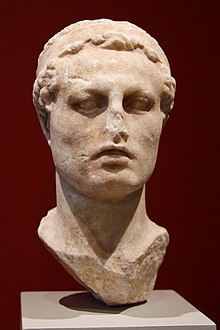
Back Antiochus IV Afrikaans አንጥያኮስ አፊፋኖስ Amharic أنطيوخوس الرابع Arabic انطيوخوس الرابع ARZ دؤردونجو آنتیوخوس AZB Антиох IV Епифан Bulgarian Antíoc IV Catalan Antiochos IV. Epifanés Czech Antiochos 4. af Seleukideriget Danish Antiochos IV. German
| Antiochus IV Epiphanes | |
|---|---|
 Bust of Antiochus IV at the Altes Museum in Berlin. | |
| Basileus of the Seleucid Empire | |
| Reign | 3 September 175 – November/December 164 BC |
| Predecessor | Antiochus, son of Seleucus IV |
| Successor | Antiochus V Eupator |
| Born | c. 215 BC |
| Died | November/December 164 BC (aged 50–51) |
| Wife | |
| Issue |
|
| Dynasty | Seleucid |
| Father | Antiochus III the Great |
| Mother | Laodice III |
| Religion | Greek polytheism |
Antiochus IV Epiphanes[note 1] (c. 215 BC–November/December 164 BC)[1] was a Greek Hellenistic King who ruled the Seleucid Empire from 175 BC until his death in 164 BC. He was a son of King Antiochus III the Great. Originally named Mithridates (or possibly its earlier, alternative form Mithradates), he assumed the name Antiochus either after the death of his elder brother Antiochus or when he ascended the throne.[2] Notable events during Antiochus' reign include his near-conquest of Ptolemaic Egypt, his persecution of the Jews of Judea and Samaria, and the rebellion of the Jewish Maccabees.
Antiochus's accession to the throne was controversial, and he was seen as a usurper by some. After the death of his brother Seleucus IV Philopator in 175 BC, the "true" heir should have been Seleucus's son Demetrius I. However, Demetrius I was very young and a hostage in Rome at the time, and Antiochus seized the opportunity to declare himself king instead, successfully rallying enough of the Greek ruling class in Antioch to support his claim. This helped set a destabilizing trend in the Seleucid Empire in subsequent generations, as an increasing number of claimants tried to usurp the throne. After his own death, power struggles between competing lines of the ruling dynasty heavily contributed to the collapse of the empire.
Antiochus's often eccentric behavior and capricious actions during his interactions with common people, such as appearing in the public bathhouses and applying for municipal offices, led some of his contemporaries to call him Epimanes (Ἐπιμανής, Epimanḗs, "The Mad"), a wordplay on his title Epiphanes.
Cite error: There are <ref group=note> tags on this page, but the references will not show without a {{reflist|group=note}} template (see the help page).
- ^ "Antiochus IV Epiphanes". Livius.org.
- ^ Mittag, Peter (26 October 2012). "Antiochos IV Epiphanes", The Encyclopedia of Ancient History. Blackwell Publishing Ltd. ISBN 9781405179355.